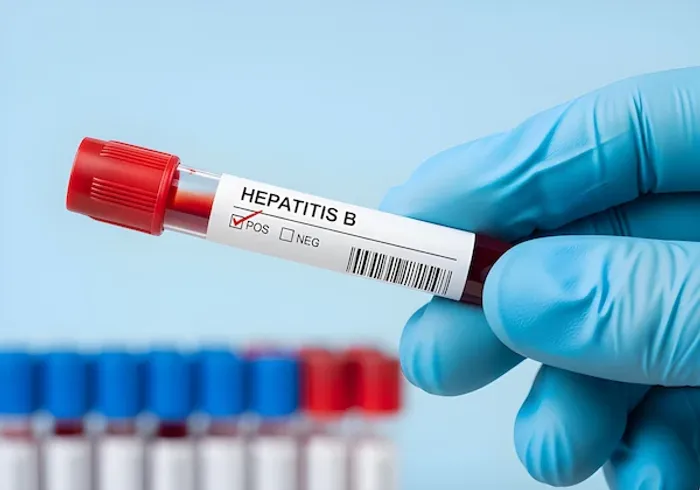Hepatitis B: Signs, Causes, and Modern Treatment Options
Know about hepatitis B, signs, causes, what it is, how it spreads, the difference between acute and chronic infection, recognising the signs and symptoms, diagnosis and prevention of hepatitis B.


Introduction
Hepatitis B is a potentially life-threatening liver infection caused by the hepatitis B virus (HBV). It's a major global health concern, with the World Health Organisation estimating 296 million people worldwide live with chronic infection. What makes hepatitis B particularly challenging is its silent nature; many people are unaware they are infected until serious liver damage occurs. This article will demystify hepatitis B, guiding you through its transmission, the critical signs to watch for, and the effective modern treatments available.
What Exactly is Hepatitis B?
Hepatitis B is an infection that attacks the liver, causing inflammation and swelling. This inflammation can range from a mild illness lasting a few weeks to a serious, lifelong chronic condition. The liver is a vital organ that processes nutrients, filters the blood, and fights infections. When it's inflamed or damaged, its ability to function can be severely impaired.
The hepatitis B virus is incredibly resilient. It can survive outside the body for at least seven days and still be capable of causing infection. This durability is a key reason why understanding its transmission is so crucial.
Consult a Hepatologist for Personalised Advice
Acute vs. Chronic Infection: Understanding the Difference
The course of a hepatitis B infection is typically defined in two phases:
- Acute Hepatitis B: This is a short-term illness that occurs within the first 6 months after someone is exposed to the virus. For most healthy adults, their immune system can fight off the infection, leading to a full recovery.
- Chronic Hepatitis B: This is a long-term illness that happens when the virus remains in a person's body. The younger a person is when infected, the higher the risk of it becoming chronic. Approximately 90% of infected infants progress to chronic disease, compared to less than 5% of healthy adults. Chronic hepatitis B can lead to serious health issues like cirrhosis (scarring of the liver), liver failure, and liver cancer.
How Do You Get Hepatitis B?
Hepatitis B is spread when blood, semen, or other body fluids from an infected person enter the body of someone who is not infected. This can happen through various means, which is why knowing the hepatitis B transmission routes is vital for prevention.
Blood-to-Blood Contact: The Primary Route
This is the most efficient way the virus spreads. It includes:
- Sharing needles, syringes, or other drug-injection equipment.
- Needlestick injuries in healthcare settings.
- Sharing razors or toothbrushes with an infected person.
- Contact with open sores or the blood of an infected person.
Mother-to-Child Transmission
Infected mothers can pass the virus to their baby during childbirth. This is a common route of transmission in regions where the virus is widespread. Fortunately, this is almost entirely preventable if the newborn receives the hepatitis B vaccine and hepatitis B immune globulin (HBIG) within the first 12 hours of life.
Other Potential Transmission Risks
While less common, the virus can also spread through:
- Unprotected sex with an infected partner.
- Inadequate sterilisation of medical, surgical, and dental equipment.
- Use of infected blood products (though this is now extremely rare in countries with rigorous blood screening).
It is important to note that hepatitis B is NOT spread through breastfeeding, sharing eating utensils, hugging, kissing, holding hands, coughing, or sneezing.
Recognising the Signs and Symptoms of Hepatitis B
Many people with hepatitis B, especially children, show no signs at all. When symptoms do appear, they usually occur between one and four months after infection and can range from mild to severe.
Symptoms of Acute Hepatitis B
Common hepatitis B symptoms for an acute infection include:
- Abdominal pain
- Dark urine
- Fever
- Joint pain
- Loss of appetite
- Nausea and vomiting
- Weakness and fatigue
- Yellowing of the skin and the whites of the eyes (jaundice)
The Dangers of Chronic Hepatitis B and Its Symptoms
People with chronic hepatitis B may live for decades without any symptoms. However, as the virus quietly damages the liver over time, signs of advanced liver disease may eventually appear, such as:
- Jaundice
- Swelling in the legs and ankles (edema)
- Confusion (hepatic encephalopathy)
- A swollen abdomen due to fluid buildup (ascites)
The Silent Threat: Asymptomatic Cases
Because so many infections are asymptomatic, many individuals are unaware they are carriers. They can unknowingly transmit the virus to others. This is why screening and blood tests are essential, especially for those in high-risk groups.
How is Hepatitis B Diagnosed?
If you suspect you've been exposed or are experiencing symptoms, a simple blood test is the only way to confirm a diagnosis. If you believe you've been at risk, consult a doctor online with Apollo24|7 for further evaluation and to arrange testing.
Blood Tests: The Key to Detection
Blood tests can detect parts of the virus (antigens), antibodies produced by your body to fight the virus, and viral DNA. The key tests include:
- HBsAg (Hepatitis B surface antigen): A positive result indicates an active infection, either acute or chronic.
- Anti-HBs (Hepatitis B surface antibody): A positive result indicates recovery from a past infection or successful vaccination.
- Anti-HBc (Hepatitis B core antibody): A positive result indicates a past or current infection.
Additional Liver Function Tests and Imaging
If chronic hepatitis B is diagnosed, your doctor may recommend:
- Liver function tests (LFTs): To measure enzyme and protein levels and assess liver health.
- Ultrasound or FibroScan: To check for liver scarring (cirrhosis) or signs of liver cancer.
- Liver biopsy: In some cases, a small sample of liver tissue may be taken for detailed analysis.
Health topic carousel:
Lab test: Blood Tests, LFT, Biopsy and Ultrasound.
Text: Get Your Symptoms Assessed
Hepatitis B Treatment: Managing the Virus
Treating an Acute Infection
There is no specific medication for acute hepatitis B. Treatment focuses on supporting your body's natural fight against the virus. This includes:
- Rest
- Adequate nutrition
- Plenty of fluids
- Avoiding alcohol and medications that can stress the liver
Managing a Chronic Infection:
Chronic hepatitis B management is a long-term process aimed at suppressing the virus and preventing liver damage. Treatment options for hepatitis B include:
Antiviral medications:
Oral drugs like entecavir, tenofovir, and others can help fight the virus and slow its ability to damage the liver. These are usually taken long-term.
Interferon injections:
This is a synthetic version of a substance your body makes to fight infection. It's often used for a finite period in younger people or those who wish to avoid long-term treatment.
Liver Monitoring for Chronic Patients
Regular monitoring is non-negotiable. This involves periodic blood tests and imaging studies to track the virus's activity and the liver's health. This helps your doctor decide when to start, change, or stop treatment.
Advanced Treatments: Liver Transplant
If the liver has been severely damaged by cirrhosis or liver cancer, a liver transplant may be the only option. This is a major surgery where the diseased liver is replaced with a healthy one from a donor.
Preventing Hepatitis B: Your Best Defense
Prevention is far more effective than treatment. The cornerstone of prevention is vaccination.
The Hepatitis B Vaccine: Safety and Schedule
The hepatitis B vaccine is one of the safest and most effective vaccines available. It is typically given as a series of 2, 3, or 4 shots over six months. It is recommended for:
- All newborns
- All children and adolescents under 19 who have not been vaccinated
- Adults at risk (healthcare workers, people with multiple sex partners, people with chronic liver disease, etc.)
Lifestyle and Precautionary Measures
Beyond vaccination, you can reduce your risk by:
- Practising safe sex using condoms.
- Never sharing needles, razors, or toothbrushes.
- Ensuring any tattoos or piercings are done with sterile equipment.
- Wear gloves if you have to touch another person's blood.
Living with Hepatitis B: Diet and Lifestyle Management
A healthy lifestyle is crucial for managing chronic HBV and protecting your liver.
- Diet: Eat a balanced diet rich in fruits, vegetables, and whole grains. Avoid high-fat and highly processed foods.
- Alcohol: Completely avoid alcohol, as it puts significant strain on the liver.
- Medications: Inform all your healthcare providers about your HBV status. Some medications, herbs, and supplements can be harmful to the liver.
- Regular check-ups: Adhere strictly to your doctor's schedule for monitoring.
Conclusion
Hepatitis B is a significant but highly manageable and preventable disease. Understanding the routes of transmission empowers you to take proactive steps to protect yourself and others. While a chronic diagnosis can feel daunting, modern medicine offers effective treatments to control the virus and allow you to live a long, healthy life. The key lies in awareness, prevention through vaccination, and, if necessary, consistent medical management. Remember, your liver health is in your hands. If you have any concerns about exposure, symptoms, or vaccination, don't hesitate to seek professional guidance.
Consult a Hepatologist for Personalised Advice
Consult a Hepatologist for Personalised Advice

Dr Suresh Raghavaiah
Hepatologist
15 Years • M.B.B.S. ,Master of Surgery (General Surgery,IHPBA Fellowship In Minimally Invasive & Hepatobiliary Surgery ,Post-Doctoral research fellowship in Immunology, ASTS Fellow.
Bengaluru
Apollo Hospitals Bannerghatta Road, Bengaluru

Dr. Swapnil Mujawdiya
Gastroenterology/gi Medicine Specialist
7 Years • MBBS, MD (Medicine), DM, Gastroenterology, SGPGI (Lucknow).
Indore
Apollo Hospitals Vijay Nagar, Indore

Dr Pramod Kumar D A
Hepatologist
15 Years • MBBS,MD General Medicine, DM in Hepatology
Bengaluru
Apollo Hospitals Bannerghatta Road, Bengaluru

Dr U V U Vamsidhar Reddy
Hepatologist
10 Years • MBBS, MD (JIPMER), DM (Hepatology, PGIMER)
Chennai
Apollo Hospitals Greams Road, Chennai
(75+ Patients)

Dr. Kumaragurubaran. S
Hepatologist
0 Years • MBBS.,MD.,FPIC.,DM.,
Tiruchirappalli
Apollo Speciality Hospitals Old Palpannai, Tiruchirappalli
(50+ Patients)
Consult a Hepatologist for Personalised Advice

Dr Suresh Raghavaiah
Hepatologist
15 Years • M.B.B.S. ,Master of Surgery (General Surgery,IHPBA Fellowship In Minimally Invasive & Hepatobiliary Surgery ,Post-Doctoral research fellowship in Immunology, ASTS Fellow.
Bengaluru
Apollo Hospitals Bannerghatta Road, Bengaluru

Dr. Swapnil Mujawdiya
Gastroenterology/gi Medicine Specialist
7 Years • MBBS, MD (Medicine), DM, Gastroenterology, SGPGI (Lucknow).
Indore
Apollo Hospitals Vijay Nagar, Indore

Dr Pramod Kumar D A
Hepatologist
15 Years • MBBS,MD General Medicine, DM in Hepatology
Bengaluru
Apollo Hospitals Bannerghatta Road, Bengaluru

Dr U V U Vamsidhar Reddy
Hepatologist
10 Years • MBBS, MD (JIPMER), DM (Hepatology, PGIMER)
Chennai
Apollo Hospitals Greams Road, Chennai
(75+ Patients)

Dr. Kumaragurubaran. S
Hepatologist
0 Years • MBBS.,MD.,FPIC.,DM.,
Tiruchirappalli
Apollo Speciality Hospitals Old Palpannai, Tiruchirappalli
(50+ Patients)
More articles from Hepatitis B
Frequently Asked Questions
Is hepatitis B curable?
For acute infections, most adults can clear the virus naturally. There is no complete cure for chronic hepatitis B, but it can be effectively controlled with lifelong antiviral treatment, which greatly reduces the risk of liver damage and allows for a normal life.
Can I get hepatitis B from food or water?
No. Unlike Hepatitis A, Hepatitis B is not spread through contaminated food or water. It is only spread through blood and other body fluids.
How long does the hepatitis B vaccine last?
Studies suggest that the hepatitis B vaccine is effective for at least 20 years, and likely lifelong in most healthy people. Booster doses are not routinely recommended for the general population.
If I have chronic hepatitis B, can I still have children?
Yes. With proper medical care, the risk of passing the virus to your baby can be reduced to less than 1%. Newborns should receive the vaccine and HBIG within 12 hours of birth.
Should I be tested for hepatitis B?
Testing is recommended if you were born in a region with high HBV rates, didn't receive the vaccine as a child, have HIV, are a man who has sex with men, have multiple sex partners, or have ever injected drugs. Apollo24|7 offers convenient home collection for tests like the Hepatitis B panel if you need to get checked.

